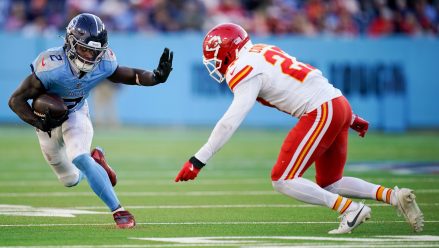Kalshi could be required to release all of its communications with the Commodity Futures Trading Commission (CFTC) and its market makers to a court, as a judge ruled that its lawsuit against the state of Nevada will require discovery.
The state and the prediction market disagreed about whether discovery of evidence was required to decide whether Kalshi’s sports event contracts constituted an illegal form of gambling. Kalshi sued Nevada in March after the state sent out a cease-and-desist ordering it to take down its sports contracts, where users can wager money on the outcome of a sporting event. Kalshi won an injunction in April, allowing it to keep offering the contracts in Nevada, at least for now.
Kalshi said no further fact-finding was needed, because the question was “purely legal,” regarding whether the federal Commodity Exchange Act (CEA) preempts Nevada’s state wagering laws.
Nevada, which has been trying to shut down Kalshi’s sports contracts in the state, argues that further facts about the company’s operations would be needed to ensure that a number of the claims it made in its initial complaint were indeed correct.
Judge says evidence is needed
On Wednesday, Magistrate Judge Brenda Weksler of the U.S. District Court for the District of Nevada ruled in Nevada’s favor on the question of discovery. She said that if Kalshi introduces arguments in its favor, it would make sense to be allowed to test the facts behind those arguments.
23ad0e6e-afd8-44e7-8b70-5de0a58ea9e6“This Court begins with the fundamental observation that a party should not be able to advance arguments in support of its dispositive motion and, at the same time, expect discovery to be denied as to the facts underpinning those arguments,” Weksler said. “Kalshi’s instant motion does just that.”
One argument Weksler mentioned is Kalshi’s claim that its contracts must qualify as “swaps” — a type of financial product mostly used for hedging — because the CFTC has not blocked it from offering them. According to the CEA, a swap must be associated with a “potential financial, economic, or commercial consequence.”
“Defendants should not be forced to accept Plaintiff’s conclusion that contracts offered on its DCM have independent real-world consequences and thus, fall under the exclusive jurisdiction of the CFTC,” Weksler said. “And, given Kalshi’s ability to self-certify contracts, Defendants should not be required to accept as a fait acompli that ‘the CFTC has taken no action to bar Kalshi’s contract on the grounds that they are not swaps.’”
The judge also said evidence should be required for the claim that Kalshi cannot comply with the Commodity Exchange Act and state gambling laws simultaneously. The prediction market has argued that it is unable to block access to sports contracts in certain states, as it says this would violate a CFTC rule requiring “impartial access” to its contracts.
Nevada’s discovery request
Kalshi may now have to produce the documents and evidence that Nevada asked for in an Aug. 1 letter, which it included in its arguments for discovery.
In that letter, Nevada asked Kalshi to produce information on “each event contract that Kalshi currently offers to Nevada citizens,” and “all efforts made by Kalshi to comply with Nevada gaming laws and regulations.”
Nevada also asks Kalshi to identify all of its institutional market makers — who receive benefits in return for making trade offers that other Kalshi customers can take — and to “identify and describe all lobbyists, public relation firms, advertising or marketing agencies that have been hired, paid, or contracted with by Kalshi with respect to Kalshi’s business in Nevada.”
Nevada also requested a number of documents, including “all communications” concerning event contracts between Kalshi and each of the federal government, the CFTC, market maker Susquehanna International Group, and Brian Quintenz — the CFTC chair nominee. Quintenz is a Kalshi director — though he has said he will step down if confirmed — and his continued involvement with Kalshi has raised conflict-of-interest questions.
Kalshi can still appeal the decision within 14 days.
It can also still object to specific discovery requests as irrelevant, overly burdensome or privileged information, requiring the judge to determine if the requests are justified. That means there is no guarantee that all of the requested information will ultimately be produced.
Kalshi is also engaged in lawsuits in New Jersey and Maryland, which have advanced to the Third and Fourth Circuit Courts of Appeal, respectively. The prediction market won a request for an injunction to keep operating in New Jersey, but failed to get a similar injunction in Maryland. However, it continues to operate in Maryland as the state paused enforcement of its cease-and-desist against the prediction market until the Fourth Circuit makes a decision on Kalshi’s appeal of the injunction.
Robinhood calls for sealed documents in NJ
Meanwhile, Robinhood — which partners with Kalshi by offering access to its event contracts — is also hoping to stop certain documents concerning the prediction market from being aired to the public in a lawsuit of its own.
Robinhood-Motion-Seal-Memo-Sept-2-2025The stock trading app is suing New Jersey, arguing that — since Kalshi won an injunction to keep offering sports event contracts and Robinhood simply offers access to Kalshi’s services — it should receive a similar injunction to keep offering those contracts in the New Jersey too.
On Thursday, Robinhood submitted a motion to seal certain documents, which would make them inaccessible to the public.
Specifically, it mentioned three exhibits that it included to support its complaint. Those are its agreement with Kalshi, its agreement with Kalshi’s clearinghouse, and its response to the New Jersey Division of Gaming Enforcement’s cease-and-desist letter.
It says the documents contain “commercially sensitive and confidential business information.”
Robinhood is also suing Nevada on similar grounds, but so far a motion to seal has not been published in that state.






